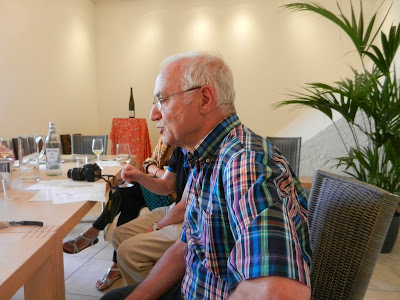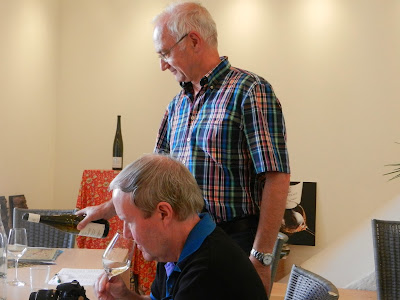Helmut Doennhoff and Ernst Loosen are very good friends. Earlier this year, Weingut Dr. Loosen co-hosted with Chateau Ste. Michelle the 4th Riesling Rendezvous in Seattle, Washington State. Among the group of 8 German elite winemakers in Seattle was Helmut Doennhoff with his wife. I had the opportunity to spend quite some time with Helmut Doennhoff.
Picture: Oliver Haag, Weingut Fritz Haag, Helmut Doennhoff, Weingut Doennhoff, Clemens Busch, Weingut Clemens Busch, Steffen Christmann, Weingut A. Christmann, Ernst Loosen, Weingut Dr. Loosen, and Wilhelm Weil, Weingut Robert Weil in Seattle
Pictures: The German Crowd with Helmut and Mrs. Doennhoff, Oliver Haag and Clemens Busch
Picture: German Winemaker Helmut Doennhoff and Mrs. Doennhoff, Weingut Doennhoff, in Seattle
Picture: Lunch - Christian G.E. Schiller, Steffen Christmann, Weingut A. Christmann, Helmut and Mrs Doennhoff, Weingut Doennhoff
Picture: Helmut Doennhoff Leaving The Chihuly Garden and Glass
For more on the 4th Riesling Rendezvous in Seattle, see:
The German Winemakers at the 4th Riesling Rendezvous in Seattle, USA
Steffen Christmann (Weingut A. Christmann) and Wilhelm Weil (Weingut Robert Weil) Presented the New Wine Classification of the VDP, Germany
The 4th Riesling Rendezvous in Seattle: Impressions from the Grand Tasting at Chateau Ste. Michelle in Woodinville, Washington State, USA
The World of Riesling in Seattle - Fourth Riesling Rendezvous in Washington State, USA
Annette Schiller’s 2013 German Wine and Culture Tour by ombiasy included a tasting at Weingut Doennhoff and we were thrilled – but not really surprised – when Helmut offered to lead us though the tasting. It turned out to be 3 most entertaining and fascinating hours. We went through 16 wines.
Pictures: Helmut Doennhoff Receiving the Ombiasy Group
For more on the Wine Tours 2013 by ombiasy, see:
Bordeaux Wine Tour 2013 by ombiasy
German Wine and Culture Tour by ombiasy, 2013
American Whiskey Producers in Germany
Weingut Doennhoff
The Dönnhoff family first came to the Nahe Valley over 200 years ago. The Dönnhoffs were a mixed farm up until the 20th century, with cereal crops, vegetables, fruit and livestock in addition to grapes. Helmut's grandfather Hermann made the transition from mixed farm to focus entirely on winegrowing. Helmut Dönnhoff took over day-to-day responsibility from his father in 1971. From the initial 4 hectares of land Helmut Dönnhoff expanded the estate to now 25 hectares. Today, his son Cornelius works alongside in the winery; in fact, ownership and responsibility has been formally transferred to Cornelius Dönnhoff.
Pictures: Tasting with Helmut Doennhoff
“Most people in wine today make it for business”, Helmut Doennhoff said. “I make it for me, myself”. Helmut Doennhoff compared his winemaking with music and cooking. “There are many wonderful scores, but only a few people can interpret them well. Or it is like a chef: people have the same ingredients but each chef brings another taste to them”.
Helmut Dönnhoff was described by Hugh Johnson as having a "fanatical commitment to quality, and a remarkable natural talent for winemaking" and as a "superstar" of the region by Robert Parker. Helmut Doennhoff was named German Winemaker of the Year in 1999 by the Gault Millau WeinGuide.
See also:
Top 10 Riesling Producers in the World – Snooth 2012
80% of Dönnhoff's of vineyard holdings grow Riesling grapes, with the remaining 20% Pinot Blanc and Pinot Gris.
Pictures: Tasting with Helmut Doenhoff
"We do not irrigate at all. We irrigated in the 1950s. My father and his colleagues did it for frost protection. After 10 or 15 years of doing it we realized that the wines were not better. In particular we saw that in places we did not irrigate, the wines were better. The roots went deeper, the wines were more intense. So we stopped irrigation 25 years ago” said Helmut Doennhoff.
Helmut Doennhoff: “Grapes are always picked by hand over 2-3 passes through each vineyard. The grapes are pressed as soon as possible – within 3 hours of picking – and fermented in large wooden casks as well as stainless steel”. Helmut Dönnhoff has designed his cellar to have enough capacity to hold a vintage either entirely in steel or entirely in wood, depending on what he feels it needs. For healthy grapes he will use a natural ferment but for botrytized grapes he will inoculate with cultured yeasts. Wines fermented in wooden casks typically spend 2–3 months in cask and then go to stainless steel. The wine spends 1 month on gross lees and 3 months on fine lees. In March the wines are filtered, and they are bottled a month or two later.
Pictures: Tasting with Helmut Doennhoff
Helmut Doennhoff splits his production between the dry and sweet styles. “Riesling has 2 faces – it has a good reputation for dry wines and in Germany it has a good reputation for fruity sweet wines. We used to use the best grapes for the sweet style wines, but the fashion has shifted to dry wines. Now high class dry wines are being made. Global warming has helped. Acidity is lower now and the grapes are riper, so the quality of wines has improved”. He concluded: “It takes 10 years to fully understand a vineyard and to know if the vineyard is better suited for dry or fruity-sweet wines.”
Tasting
2012 Doennhoff Riesling dry
Pale greenish gold in the glass, notes of honeysuckle and white flowers on the nose, good structure, bright.
2012 Doennhoff Tonschiefer Riesling dry
Pale greenish gold in the glass, notes of flowers and wet stones on the nose, bright mineral flavors on the palate, good finish.
2012 Kreuznacher Kahlenberg Riesling dry
The Kreuznacher Krötenpfuhl vineyard has perfect drainage due its topsoil of pebbles over loam soil; characteristic are wines with a mineralic elegance.
Palest greenish gold in the glass, notes of honeysuckle on the nose, zingy acidity and aromas of green apple on the palate, floral.
2012 Felsenberg “Felsentuermchen” Riesling dry Grosses Gewaechs
The Schlossböckelheimer Felsenberg is a very old site with porphyry soil.
Pale gold in the glass with a greenish hint, notes of crushed stones and green apple on the nose, aromas of lime zest and white flowers on the palate, pure, exceptional.
2012 Dellchen Riesling dry Grosses Gewaechs
The Norheimer Dellchen is a steep terraced vineyard in a rocky hollow with porphyry and slate soil.
Pale greenish gold in the glass, notes of ripe peach on the nose, rich palate with notes of flowers and spicy fruit, crisp and mouth-filling, great wine.
2012 Hermannshoehle Riesling dry Grosses Gewaechs
Niederhäuser Hermannshöhle, perhaps the most famous of all the Nahe vineyards, is a slate vineyard with many conglomerates of volcanic rocks, mostly porphyry and melaphyr.
Pale greenish gold in the glass, notes of honeysuckle and Asian pear on the nose, aromas of crushed stones on the palate, vibrant, incredible length.
2012 Doennhoff Riesling off-dry
Pale greenish gold in the glass, lemon notes on the nose, creamy on the palate, good entry-level wine with some sweetness.
2012 Kreuznacher Kroetenphuhl Riesling Kabinett
Pale greenish gold in the glass, honeysuckle and green apple notes on the nose, bright green apple and white flowers on the palate, bright and long, lightly sweet.
2012 Oberhaeuser Leistenberg Riesling Kabinett
Oberhäuser Leistenberg, the oldest vineyard held by the family, has slate soils and produces fruity wines with elegant acidity.
Pale greenish gold in the glass, notes of lemon oil and clover honey on the nose, wet stone aromas with honey and lemon citrus on the palate, bright, long.
2012 Norheimer Kirschheck Riesling Kabinett
Norheimer Kirscheck sits on a steep south slope of slate soil.
Pale greenish gold in the glass, notes of pear and oranges on the nose, good structure, notes of green apple and pineapple on the palate, great Kabinett wine.
2012 Oberhaeuser Bruecke “Monopol” Riesling Spaetlese
The Oberhäuser Brücke, the smallest vineyard in the Nahe, is a tiny parcel saddled on the Nahe River that Dönnhoff owns in entirety. The Brücke has grey slate covered by loess-clay and the vines ripen even later here than in the Hermannshöhle due to large diurnal temperature swings along the river.
Pale greenish gold in the glass, notes of green apple and honeysuckle on the nose, flavors of wet stones, green apple, and hints of lime juice on the palate, wonderful wine.
2003 Oberhaeuser Bruecke “Monopol” Riesling Spaetlese
Light yellow-gold in the glass, attack of perfumed apricots, ripe peaches, and candied orange peel on the nose, aromas of apricots, honey and wet stone on the palate, long and mouthwatering finish thanks to stunning acidity.
2012 Oberhaeuser Bruecke “Monopol” Riesling Auslese
As its site is adjacent to the river, the Bruecke Riesling vineyard develops noble rot easily. Hand selected fruit.
Light yellow-gold in the glass, notes of wet leaves, honey, and ripe peaches on the nose, green apple and ripe peach aromas on the palate, a mouthwatering wine long and clean.
2012 Dönnhoff Oberhäuser Brücke Riesling Eiswein
Pale greenish gold in the glass, notes of candied green apple and honey on the nose, on the palate, mouthwatering green apple, apricot, and honey aromas are backed by a high acidity, nice silky texture.
schiller-wine - Related Postings
The German Winemakers at the 4th Riesling Rendezvous in Seattle, USA
Steffen Christmann (Weingut A. Christmann) and Wilhelm Weil (Weingut Robert Weil) Presented the New Wine Classification of the VDP, Germany
The 4th Riesling Rendezvous in Seattle: Impressions from the Grand Tasting at Chateau Ste. Michelle in Woodinville, Washington State, USA
The World of Riesling in Seattle - Fourth Riesling Rendezvous in Washington State, USA
German Spaetlese Wines Can Come in Different Versions. I Have Counted Five.
Caroline and Armin Diel, Schlossgut Diel (Nahe Valley), Presented their New Wines (Vintage 2012), Germany
At Weingut Jakob Jung in Erbach, Rheingau, with Winemaker Alexander Johannes Jung, Germany
Bordeaux Wine Tour 2013 by ombiasy
German Wine and Culture Tour by ombiasy, 2013
American Whiskey Producers in Germany
Top 10 Riesling Producers in the World – Snooth 2012






















No comments:
Post a Comment